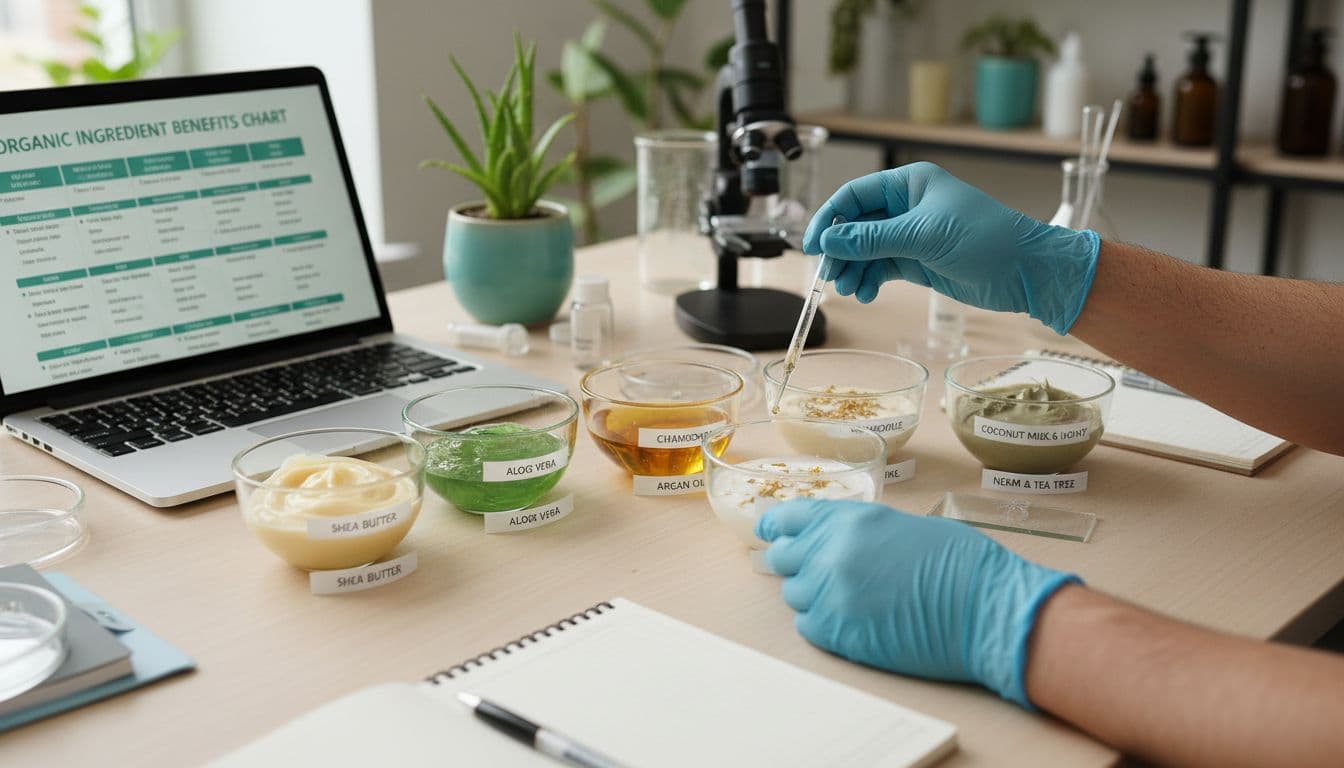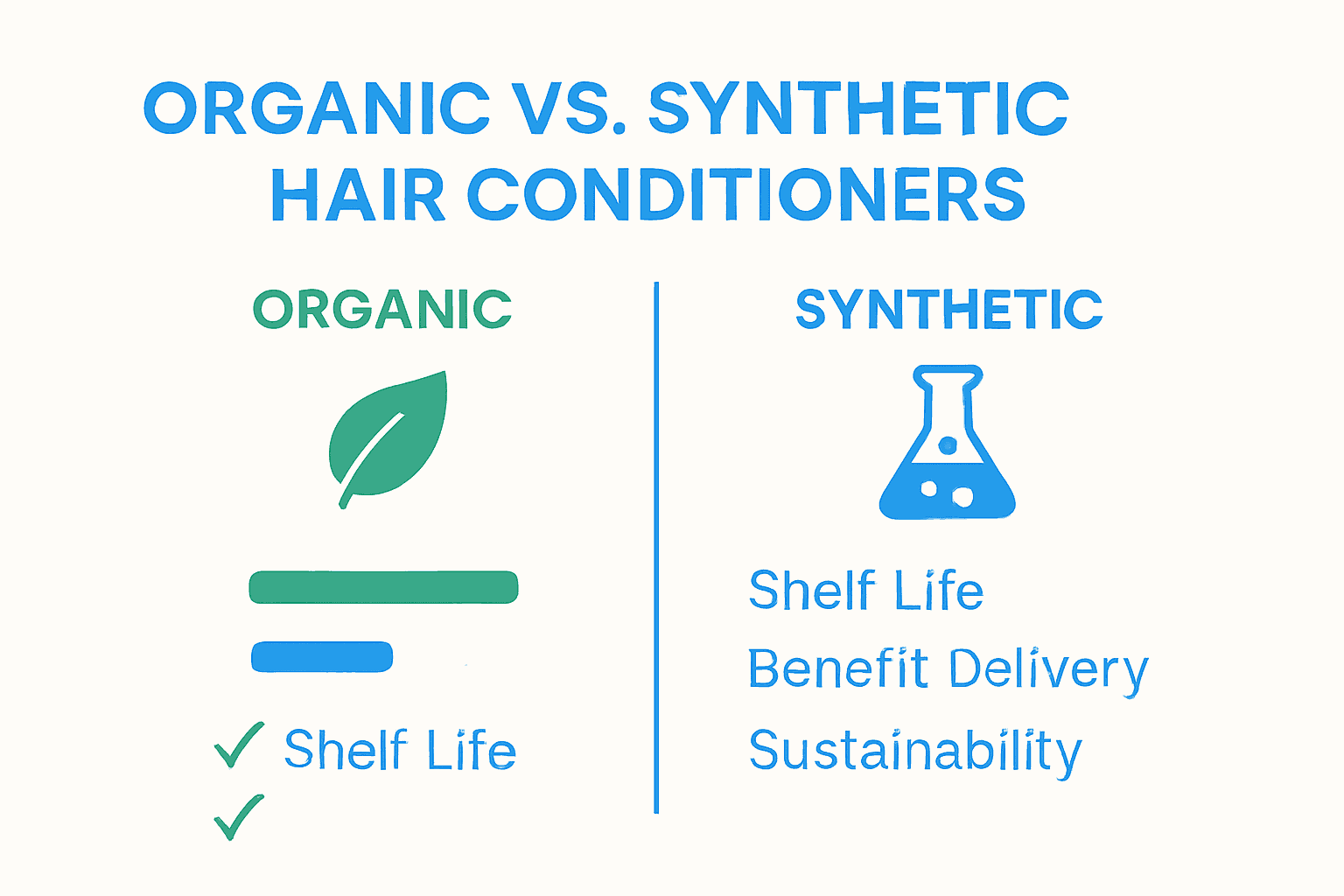Blog
Learning Materials
Organic Hair Conditioner: Everything You Need to Know
Updated: November 8, 2025

Over 60 percent of shoppers now seek out hair care with organic ingredients for both personal and environmental reasons. The growing demand for organic hair conditioners means more products and certifications than ever, making the decision process confusing. With detailed standards shaping what truly counts as organic, understanding these guidelines helps you spot authentic choices and get the healthy, natural results you want.
Table of Contents
- Defining Organic Hair Conditioner Standards
- Types and Key Natural Ingredients Used
- How Organic Conditioners Nourish Hair
- Benefits Over Synthetic Conditioners
- Potential Drawbacks and Misconceptions
Key Takeaways
| Point | Details |
|---|---|
| Certification Standards | Organic hair conditioners should meet NSF/ANSI 305 and Green Seal standards to ensure high organic content and sustainable practices. |
| Natural Ingredients | Key ingredients like shea butter, aloe vera, and oils provide nourishing and conditioning benefits tailored to hair needs. |
| Health Benefits | Organic conditioners reduce chemical exposure and support skin and scalp health, emphasizing long-term nourishment over instant results. |
| Considerations | Users should be aware of potentially shorter shelf lives and the need for consistent use to achieve desired effects. |
Defining Organic Hair Conditioner Standards
Understanding the standards behind organic hair conditioners is crucial for consumers seeking natural, environmentally conscious hair care solutions. According to NSF International, organic personal care products like hair conditioners must meet specific certification requirements to earn their classification.
The NSF/ANSI 305 standard provides clear guidelines for organic hair product manufacturing. This rigorous certification mandates that products contain at least 70% organic ingredients by weight, ensuring substantial natural content. Manufacturers must demonstrate transparent sourcing, processing methods, and ingredient purity to receive this prestigious certification.
Additionally, Green Seal offers comprehensive environmental standards for personal care products. Their GS-50 standard goes beyond ingredient percentages, establishing holistic requirements that consider:
- Environmental sustainability of production processes
- Worker safety and fair labor practices
- Minimal ecological impact of ingredient sourcing
- Reduction of harmful chemical additives
- Transparent supply chain documentation
These standards protect consumers by creating accountability in the organic hair care industry. By understanding these certifications, you can make informed choices about the products you use, ensuring they align with your health and environmental values. When shopping for organic hair conditioners, look for products displaying NSF or Green Seal certifications as a reliable indicator of genuine organic quality.
Types and Key Natural Ingredients Used
Organic hair conditioners draw their power from an incredible array of natural ingredients that provide comprehensive hair nourishment. EPA Archives highlights several key natural components that form the backbone of effective organic hair care, including moisturizing powerhouses like shea butter, chamomile, sunflower oil, honey, and aloe vera.
Traditional hair care practices have long recognized the transformative potential of botanical ingredients. According to National Institutes of Health, ancient hair care traditions incorporate powerful natural ingredients such as amla, shikakai, and reetha, which are renowned for their remarkable hair-strengthening and conditioning benefits.
Natural ingredients can be categorized into several key types based on their specific hair care functions:
- Moisturizing Agents: Shea butter, coconut oil, avocado oil
- Protein-Rich Ingredients: Keratin, wheat protein, silk protein
- Herbal Extracts: Aloe vera, chamomile, lavender
- Nutrient-Dense Oils: Argan oil, jojoba oil, castor oil
When exploring good natural hair products, understanding these ingredient categories can help you select conditioners that truly support your hair's unique needs. Each natural ingredient brings its own set of benefits, from deep hydration to strengthening hair follicles, making organic hair conditioners a holistic approach to hair health.

How Organic Conditioners Nourish Hair
Organic hair conditioners work at a deep cellular level to transform and revitalize hair health. National Institutes of Health research reveals that these natural products go far beyond surface-level treatment, actively improving hair's fundamental characteristics by mimicking the hair's natural lipid layer.
The nourishing process of organic conditioners involves several critical mechanisms. They restore hydrophobicity, which means helping hair repel excess moisture while maintaining essential internal hydration. This process simultaneously seals the hair cuticle, creating a protective barrier that prevents damage and enhances overall hair strength and resilience.
Key nourishment mechanisms include:
- Cuticle Restoration: Smoothing and repairing damaged hair shaft
- Moisture Balance: Providing deep hydration without artificial buildup
Pro Tip: Organic conditioners work best when matched to your specific hair type and texture.
For those interested in deeper hair care strategies, craft your own homemade hair conditioner can be an excellent way to understand how natural ingredients interact with your unique hair structure. The goal of organic conditioning isn't just cosmetic improvement, but holistic hair health that starts from the root and extends to the hair tip.
Benefits Over Synthetic Conditioners
Organic hair conditioners represent a revolutionary approach to hair care that goes far beyond cosmetic enhancement. Green Seal standards highlight the critical differences between organic and synthetic conditioners, emphasizing the profound health and environmental benefits of choosing natural hair care solutions.
The primary advantages of organic conditioners stem from their chemical-free composition. Unlike synthetic alternatives that rely on harsh artificial ingredients, organic conditioners leverage natural compounds that work in harmony with your hair's biological structure. This means reduced exposure to potentially harmful chemicals like silicones, parabens, and sulfates that can strip hair of its natural protective layers.
Key benefits of organic conditioners include:
- Reduced Chemical Exposure: Minimizing contact with artificial preservatives and synthetic additives
- Environmental Sustainability: Supporting production methods that prioritize ecological balance
- Skin and Scalp Health: Gentler formulations that prevent irritation and allergic reactions
- Long-Term Hair Nutrition: Providing deep, natural nourishment without synthetic buildup
For those seeking comprehensive hair care strategies, understanding treatment for over-processed hair can provide additional insights into how natural ingredients can repair and restore damaged hair. Ultimately, choosing organic conditioners is an investment in both personal health and environmental responsibility.
Potential Drawbacks and Misconceptions
While organic hair conditioners offer numerous benefits, they are not without their challenges. EPA Archives reveals an important consideration for users: natural products often have shorter shelf lives due to the absence of synthetic preservatives, which means they require more careful storage and potentially more frequent replacement.
National Institutes of Health research highlights that organic conditioners may not always match the conditioning performance of synthetic products, especially for individuals with chemically treated or severely damaged hair. This performance variation stems from the different chemical compositions and binding mechanisms of natural ingredients.
Common misconceptions about organic hair conditioners include:
- Instant Results: Natural products often require consistent, long-term use for noticeable improvements
- Universal Effectiveness: Not all organic ingredients work identically for every hair type
- Cost: Higher quality natural ingredients can make these products more expensive
- Preservation: Shorter shelf life requires more mindful purchasing and storage
Pro Tip: Always check the manufacturing and expiration dates on organic hair care products.
For those navigating the complexities of hair care, understanding treatment for over-processed hair can provide additional context about managing hair health with natural products. The key is approaching organic conditioners with realistic expectations and a willingness to experiment.

Take Control of Your Hair Health with Personalized Organic Care
Understanding organic hair conditioners and their true benefits is just the first step toward healthier hair. If you struggle with choosing the right natural products or want to avoid harsh chemicals that damage your scalp and hair, you are not alone. Many people face challenges finding conditioners tailored to their unique hair type and condition. This is where personalized insights make a powerful difference.

At MyHair.ai, we harness AI technology to analyze your hair health deeply and recommend natural, effective conditioners that complement your specific hair needs. Our platform helps you identify the best organic ingredients to nourish your hair, avoid common pitfalls like over-processed hair damage, and track real improvement over time. Ready to move beyond guesswork and make informed choices for long-lasting hair vitality? Explore our personalized solutions today and start your journey to healthier, stronger hair with tailored product recommendations designed just for you.
Frequently Asked Questions
What are the standards for organic hair conditioners?
Organic hair conditioners must meet certification requirements like the NSF/ANSI 305 standard, which mandates at least 70% organic ingredients by weight and transparency in sourcing and processing methods.
What are common natural ingredients found in organic hair conditioners?
Key natural ingredients include moisturizing agents like shea butter and coconut oil, protein-rich ingredients like keratin and wheat protein, and herbal extracts such as aloe vera and chamomile, all of which provide nourishment and hydration to the hair.
How do organic conditioners nourish hair compared to synthetic ones?
Organic conditioners nourish hair by restoring hydrophobicity, sealing the cuticle, and providing deep hydration without synthetic buildup, whereas synthetic conditioners may use harsh chemicals that can strip hair of its natural protective layers.
Are there any drawbacks to using organic hair conditioners?
Yes, potential drawbacks include shorter shelf lives due to the lack of synthetic preservatives, possible performance variation compared to synthetic products, and some may require consistent use for noticeable results.